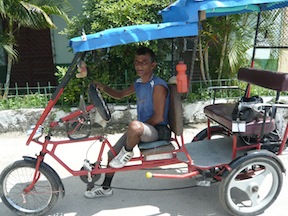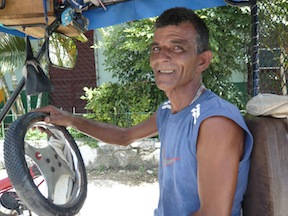Changes in Cuba and the Caravan; same old blockade
The 24th Pastors for Peace Caravan to Cuba will leave the US
on July 16th, bound for Cuba. This
is an ongoing struggle against the illegal, immoral US blockade of Cuba, which
uses denial of essentials like medicine and pacemakers as a political weapon,
and it is a struggle we must win, not only for the sake of Cuba, but for our
own sakes, so that, at least in this case, we can stop being responsible for
deliberately causing suffering.
As people of conscience, we travel to Cuba as an act of
conscious civil disobedience. We
are protesting both the blockade and the US government's restriction of travel
to Cuba. What is it we aren't
supposed to go there and see?
Cuba is a process, not a fixed result. We've been taught to think of socialist
countries as stagnant bureaucracies.
There may have been some truth to this idea applied to Central Europe,
but not to Cuba - it is the most innovative country in the world at this
time. This isn't just my opinion:
Cuba was the only nation in the world that meets the Worldwide Fund for
Nature's definition of sustainable development, for example. Cuba's achievements in literacy,
education, and health care are well known. Their biotechnology innovations are
also widely recognized. They have managed some remarkable work-arounds to deal
with restrictions and shortages caused by the blockade. They have developed
methods of agriculture, including urban gardens, which are innovative, organic,
and use human and animal power to limit the need for fossil fuels; and their
transportation alternatives include the usual buses, but also bicycle and
horse-drawn transport. They have
developed a system of representation which starts with elected delegates from
the school, workplace and neighborhood level, and which eliminates the power of
money in politics.
Does this all work perfectly? Of course not.
Cuba has had a number of wrong and failed policies. What is remarkable is that the Cubans
have been able to recognize this and change things. Cuba and its revolution are
in a continuing process of re-invention, and this is very obvious in regard to
the attitude toward religion. Many
people do not know that there are churches in Cuba. The churches are packed and
there is no discouragement of religion.
The initial Soviet-style anti-religion hostility has been reversed. The Cubans are pleased to be able to
love both the church and the revolution without contradiction.
Ebenezer Baptist Church, in Marianao, HavanaA Catholic church in the same neighborhood
The Martin Luther King Center is associated with Ebenezer Baptist Church.
This poster hangs in a Baptist Church office: HUmanity is diversity; Campaign against homophobia.
The youth choir
For over half of all religious Cubans, Santería is part of religious belief.
Another obvious change shows in attitudes regarding homosexuality
and sexuality in general, also quite influenced by Soviet attitudes
previously. There is no official stigma
attached to sexual differences, there is an official anti-homophobia campaign,
AIDS patients are not quarantined. A Cenesex (the official government
department having to do with issues of sexual preference and sexuality) worker
introduced us to the concept of LGBTH, in which H is heterosexuals, just
another choice in the mix.
The worst symptom of AIDS is loneliness. YOU CAN CARE FOR THIS.
Solidarity with people who live with AIDS has no boundaries.
Another recent change is the encouragement of more
self-employment. This is still a
work in progress with an unclear future and self-employment is very small
scale, but those who want Cuba to become a capitalist economy open to foreign
exploitation are going to be disappointed. Most Cubans, not all, and some US visitors, again not all,
understand that the standard of comparison for Cuba may not be
upper-middle-class US life but rather that of other Caribbean nations, which
make Cuba look very good indeed.
TYPICAL SMALL-SCALE SELF EMPLOYMENT EFFORTS
Reynaldo, with his bicitaxi, which has, in addition to the customized steering wheel, mascots, water bottle, awning and a boom-box
Zaida, with a friend; in the background there is a fruitstand.
A lot of sidewalk stands sell various goods, some of them junk.
The cotton candy stand at a carnival in Yaguajay
There are many sidewalk take-out cafes operated from the front of people's homes. This is a typical menu board.
This young cabinet-maker works from his back yard.
TYPICAL SMALL-SCALE SELF EMPLOYMENT EFFORTS
Reynaldo, with his bicitaxi, which has, in addition to the customized steering wheel, mascots, water bottle, awning and a boom-box
Zaida, with a friend; in the background there is a fruitstand.
A lot of sidewalk stands sell various goods, some of them junk.
The cotton candy stand at a carnival in Yaguajay
There are many sidewalk take-out cafes operated from the front of people's homes. This is a typical menu board.
This young cabinet-maker works from his back yard.
A note: there
are millions of working children in the world. Not one of them is Cuban.
In the past year the requirement for exit visas for travel
from Cuba was eliminated. Cubans
now have more legal freedom to travel than US citizens, who are prohibited by
the US government from going to Cuba without special license.
No restrictions are placed on US citizens' travel by the Cuban government. There is no requirement to stay with a group or to be accompanied or monitored in any way. You can travel freely throughout the island.
No restrictions are placed on US citizens' travel by the Cuban government. There is no requirement to stay with a group or to be accompanied or monitored in any way. You can travel freely throughout the island.
The Caravan this year will be organized differently. We will still send the message that the
blockade is immoral and unacceptable and must be lifted. We will still take aid to Cuba -
medications and other portable aid carried in our baggage. There will be no bus routes; we will
gather in cities across North America during Cuba Caravan Week, July 8 -
15. The event in Fresno will be
July 12 at 6:30, potluck, music, and speaker, at College Community
Congregational Church 5550 N. Fresno between Bullard and Barstow.
Caravanistas from Fresno will then participate in a major
event in the Bay Area on July 15, fly to Mexico City for orientation, and then
to Santiago de Cuba.
Santiago is a wonderful city, located on hills above a
harbor like a little San Francisco, but founded in 1515.
I was there in 2010 and it was remarkable for the friendliness of the people, their revolutionary spirit, and the vibrant music scene. It was the cradle of the revolution, where the attack on the Moncada Army Barracks took place. We'll be able to celebrate the 60th anniversary of the start of the Revolution on July 26.
I was there in 2010 and it was remarkable for the friendliness of the people, their revolutionary spirit, and the vibrant music scene. It was the cradle of the revolution, where the attack on the Moncada Army Barracks took place. We'll be able to celebrate the 60th anniversary of the start of the Revolution on July 26.
Santiago suffered very serious damage in Hurricane Sandy,
which devastated eastern Cuba.
More than 130,000 homes were lost along with schools, hospitals and
other infrastructure; crops were totally destroyed. We will work with our Cuban partners to help reconstruct
homes and buildings. It's a
different Caravan, and a very exciting change. If you can't go with us, be sure to be there for our
send-off on July 12, 6:30 PM, at College Community Congregational Church 5550
N. Fresno between Bullard and Barstow, and for our report-back afterward, when
we'll tell you all about it.
And please, go see for yourself. If you do not wish to engage in civil disobedience or
"illegal" (does the government have the right to tell you where you
can travel?) personal travel, seek out a licensed cultural exchange tour. But go check it out. Cuba has many problems, but Cubans are
innovative, vibrant, educated, and friendly and they are in the process of
constructing a working alternative to corporate capitalism. It's worth seeing.





















